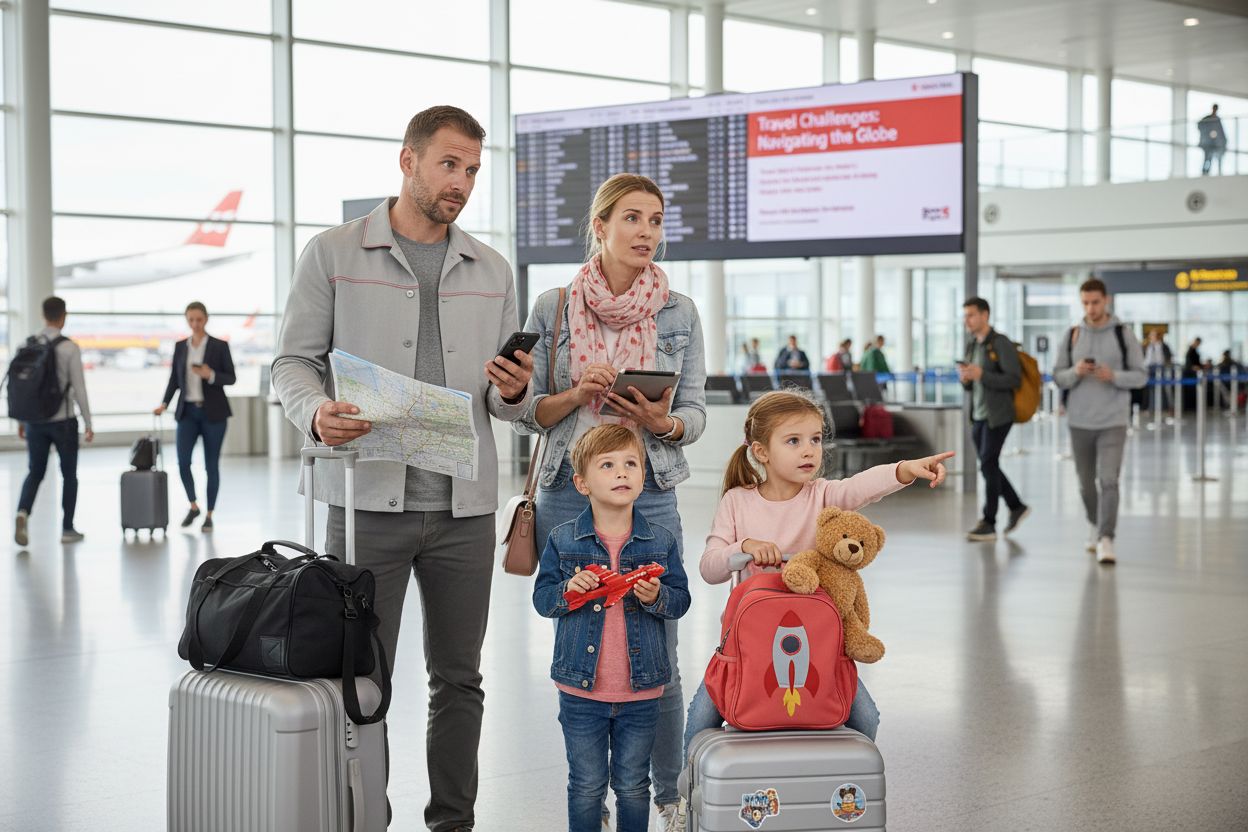Traveling across the United States sounds out of reach for many wallets. After all, who imagines exploring famous cities and breathtaking parks without spending a fortune? Yet, smart travelers regularly slice their expenses by impressive amounts. Some save up to 70 percent on lodging and 20-30 percent on accommodations and attractions just by picking the right timing and places. Instead of sacrificing comfort or missing out, these strategies let you keep more cash while making your trip even more memorable.
Table of Contents
- Smart Planning For Affordable Trips
- Best Ways To Save On Transportation
- Budget-Friendly Lodging And Food Ideas
- Maximizing Free And Low-Cost Activities
Quick Summary
| Takeaway | Explanation |
|---|---|
| Travel during off-peak seasons. | Off-season travel can save 20-30% on accommodations and attractions while maintaining high-quality experiences. |
| Be flexible with booking dates. | Midweek travel is often cheaper; utilize fare alerts for better deals on flights and lodgings. |
| Consider alternative accommodations. | Choosing hostels or home exchanges can help travelers save up to 70% on lodging costs. |
| Utilize public transportation efficiently. | Public transit often has discounts available for seniors, students, and low-income travelers, reducing travel costs significantly. |
| Explore free local activities. | Many U.S. cities offer free cultural events and park access, helping you enjoy your trip without spending much. |

Smart Planning for Affordable Trips
Planning a budget friendly trip requires strategic thinking and smart decision making. Travelers can significantly reduce expenses by implementing targeted strategies that maximize value without compromising the travel experience. The key is understanding how to allocate your travel budget effectively and make informed choices that optimize your spending.
Timing Your Travel Strategically
Timing plays a crucial role in saving money on travel. Explore our guide on optimal travel periods to understand how seasonal variations impact travel costs. According to AARP’s travel research, traveling during off-season or shoulder seasons can dramatically reduce expenses. These periods occur when destination demand is lower but the experience remains high quality.
Off-peak travel periods typically offer substantial discounts on accommodations and attractions. For example, visiting popular national parks in early spring or late autumn can result in savings of 20-30% compared to peak summer rates. Mountain destinations might offer cheaper rates during non-ski seasons, while coastal regions frequently have reduced pricing outside summer months.
Flexible Booking and Budget Optimization
Flexibility is your greatest asset when saving money on travel. Airline and hotel prices fluctuate based on demand, day of the week, and advance booking windows. Midweek flights and accommodations are often cheaper than weekend options. Utilizing price comparison tools and setting up fare alerts can help you identify the most cost effective travel windows.
Consider alternative accommodation options beyond traditional hotels. Vacation rentals, hostels, and budget friendly hotels can provide significant savings. Some travelers save up to 40% by choosing non traditional lodging that offers similar comfort and amenities. Additionally, many accommodations provide kitchen facilities, allowing you to reduce food expenses by preparing some meals yourself.
Smart Destination and Transportation Choices
Choosing your destination wisely can dramatically impact overall travel expenses. Some regions offer more budget friendly experiences without compromising on quality. National parks, smaller cities, and less touristy regions often provide rich experiences at a fraction of traditional vacation costs. Check out our family vacation planning resource for additional insights into affordable travel destinations.
Transportation represents another significant expense. Consider alternatives like road trips, which can be more economical than flying, especially for group travel. Carpooling, using public transportation, and selecting destinations with walkable city centers can further reduce movement related expenses. Some travelers save hundreds of dollars by carefully planning their transportation strategy.
Effective travel planning is about making intelligent compromises and understanding where to invest your travel budget. By implementing these strategies, you can create memorable experiences without financial strain. The goal is not just saving money but creating meaningful travel moments that provide exceptional value for every dollar spent.
Best Ways to Save on Transportation
Transportation costs can quickly consume a significant portion of your travel budget, but strategic planning and smart choices can dramatically reduce these expenses. Understanding the various transportation options and implementing cost saving techniques allows travelers to maximize their mobility while minimizing financial strain.
Strategic Vehicle and Fuel Efficiency
Choosing the right transportation method can lead to substantial savings. Learn more about budget travel strategies for comprehensive planning. According to Experian’s research, selecting a fuel efficient vehicle can save travelers nearly $918 annually. This calculation assumes driving 15,000 miles per year with a vehicle achieving 30 miles per gallon compared to one getting 20 miles per gallon.
For road trips, consider renting vehicles with better fuel economy. Compact and hybrid cars typically offer superior mileage, reducing overall transportation expenses. Additionally, using mobile apps to compare fuel prices along your route can help identify the most affordable gas stations, potentially saving cents per gallon which accumulate over long distances.
Public Transportation and Discount Options
Public transportation represents a cost effective alternative to private vehicle travel. Military.com reveals that federal and state governments offer tax benefits for commuters. Employees can spend up to $105 monthly in pretax money on transit passes or van pool expenses, creating significant potential savings.
According to Wikipedia’s research, many public transportation systems provide reduced fare options. These discounts typically extend to specific groups including seniors, students, military personnel, and low income passengers. Travelers can save 25-50% on standard transportation costs by leveraging these programs. City passes and multi day transit tickets often provide additional discounts compared to single ride purchases.
Innovative Transportation Strategies
Technology has revolutionized transportation savings. Ride sharing platforms, carpooling apps, and comprehensive travel planning tools offer multiple ways to reduce transportation expenses. Booking group transportation or utilizing shared ride services can split costs among multiple travelers. Some travelers report saving up to 60% on transportation by strategically combining different travel methods.
Consider alternative transportation options like bike rentals in walkable cities, regional bus services, and combined transportation packages. Some destinations offer comprehensive travel passes that include multiple transportation modes at a discounted rate. Research local transportation options before your trip to identify the most economical solutions.
Smart transportation planning goes beyond simply selecting the cheapest option. It involves understanding your specific travel needs, being flexible with your approach, and leveraging available technologies and discount programs. By combining these strategies, travelers can significantly reduce transportation expenses while maintaining comfort and convenience during their journeys.
Budget-Friendly Lodging and Food Ideas
Traveling affordably requires strategic planning for two of the most significant expenses: lodging and food. Smart travelers understand that creative approaches can dramatically reduce these costs without sacrificing comfort or experience. By thinking outside traditional travel norms, you can discover numerous ways to minimize spending while maximizing enjoyment.
Here’s a comparison table summarizing different lodging options and their potential savings, as discussed in the article. This can help you quickly evaluate which alternative lodging strategy may best fit your travel needs.
| Lodging Option | Potential Savings | Key Benefits |
|---|---|---|
| Hostels | Up to 70% on lodging | Budget-friendly, social environment |
| University Dorms (off-season) | Significant savings | Affordable, often central locations |
| Cooperative Housing | Significant savings | Community-focused, unique experience |
| Couchsurfing/Home Exchange | Up to 70% on lodging | Free or very low cost, local insights |
| Vacation Rentals | Up to 40% on lodging | Kitchen facilities, shared expenses |
| Mid-week Hotel Bookings | 30-40% off room rates | Lower rates compared to weekends |
Innovative Lodging Strategies
Explore our comprehensive travel planning guide for additional budget travel insights. According to University of Idaho Extension research, travelers can significantly reduce accommodation expenses by considering unconventional options. Hostels, university dormitories during off-seasons, and cooperative housing represent excellent alternatives to traditional hotels.
Couchsurfing platforms and home exchange networks offer incredible opportunities for budget conscious travelers. These platforms connect travelers with local hosts willing to provide free or low cost accommodations. Some travelers report saving up to 70% on lodging expenses by using these networks. Additionally, many platforms verify user profiles and provide reviews, ensuring a safe and reliable experience.
Consider leveraging loyalty programs and credit card rewards for hotel stays. Many travel credit cards offer points that can be redeemed for free nights or significant discounts. Booking during off peak seasons and being flexible with your travel dates can result in substantial savings. Some hotels offer mid week discounts or last minute deals that can reduce room rates by 30-40%.
Strategic Food Cost Reduction
Food expenses can quickly escalate during travel, but numerous strategies can help manage these costs. Selecting accommodations with kitchen facilities allows you to prepare your own meals, potentially saving hundreds of dollars during a trip. Grocery stores often offer prepared meals and ingredients at a fraction of restaurant prices.
Local farmers markets and community food halls provide affordable and authentic dining experiences. These venues typically offer fresh, local cuisine at more reasonable prices compared to tourist restaurants. Street food and local eateries frequented by residents often provide delicious meals at significantly lower costs than tourist focused establishments.
Maximizing Value and Minimizing Expenses
Technology offers numerous tools for budget travelers. Price comparison apps and websites can help you find the best deals on accommodations and dining. Some apps provide real time notifications about discounts and special offers. Booking accommodations slightly outside city centers can also reduce costs while providing opportunities to explore less touristy areas.
Consider group travel or splitting costs with fellow travelers. Shared accommodations like vacation rentals can dramatically reduce individual expenses. Many platforms now offer rooms or entire apartments that can be shared, providing both cost savings and social opportunities.
Budget friendly travel is not about deprivation but about making intelligent choices. By combining creativity, technology, and flexibility, you can create memorable travel experiences without financial stress. The key is approaching travel with an open mind and willingness to explore alternative options that provide both value and enjoyment.

Maximizing Free and Low-Cost Activities
Traveling on a budget does not mean compromising on experiences. The United States offers an abundance of free and low-cost activities that can transform your trip from expensive to extraordinary. Smart travelers understand that memorable moments do not always require significant financial investment.
National Parks and Natural Attractions
Discover budget friendly travel strategies to maximize your adventures. The National Park Service provides incredible opportunities for affordable exploration. Many national parks offer free entrance days throughout the year, allowing travelers to experience breathtaking landscapes without paying admission fees. According to the National Park Service, these free days typically occur on significant holidays and commemorative occasions.
State parks frequently offer even more affordable experiences compared to national parks. Annual state park passes can cost as little as $20-$50, providing unlimited access to multiple parks within a state. Many state parks feature hiking trails, camping areas, wildlife viewing opportunities, and educational programs at minimal or no additional cost. Some parks even offer free ranger-led tours that provide deep insights into local ecology and history.
Urban Exploration and Cultural Experiences
Major cities across the United States provide numerous free cultural experiences. Many museums offer specific days or hours with complimentary admission. Smithsonian Museums in Washington DC consistently provide free entry to all their institutions, presenting world class exhibits without ticket costs. Art galleries, university museums, and community centers frequently host free exhibitions and events.
Public libraries and community centers serve as unexpected treasure troves of free activities. Many organize free workshops, language exchanges, cultural performances, and educational programs. City walking tours, often operated on a tip basis, provide comprehensive introductions to local history and culture. Some cities maintain free concert series in public parks, offering live music experiences without admission charges.
Digital and Community Resources
Technology has revolutionized discovering free activities. Websites and apps like Eventbrite, Meetup, and local community calendars list numerous no-cost events. From outdoor movie screenings to community festivals, these platforms connect travelers with authentic local experiences. Many cities maintain official tourism websites highlighting free weekly events and attractions.
College campuses offer remarkable free resources for travelers. Student art exhibitions, theatrical performances, guest lectures, and sporting events are typically open to the public at no charge. Research local university schedules to identify potential free cultural and educational experiences during your travel dates.
Seasonal festivals and community celebrations provide another avenue for cost-free entertainment. Many towns host annual events celebrating local culture, heritage, or seasonal changes. These gatherings often include live music, dance performances, food demonstrations, and interactive experiences without admission fees.
Maximizing free and low-cost activities requires creativity, flexibility, and willingness to explore beyond traditional tourist paths. By combining online research, local recommendations, and an adventurous spirit, travelers can craft rich, memorable experiences without straining their budget. The most authentic travel moments often emerge from unexpected, unplanned interactions and discoveries that cost nothing but provide immeasurable value.
The following table summarizes various free and low-cost activity options in the United States, along with typical features or strategies for maximizing savings. This makes it easy to spot ideas for enjoyable, budget-friendly experiences during your trip.
| Activity Type | Free/Low-Cost Option | Notable Features/Strategies |
|---|---|---|
| National Parks | Free Entrance Days | Plan trips on fee-free holidays to avoid entrance costs |
| State Parks | Annual Passes ($20-$50) | Unlimited access, free tours and programs |
| Museums (Major Cities) | Free admission times | Visit during special times/days for complimentary entry |
| Public Libraries/Community | Free workshops/events | Educational programs, performances, cultural experiences |
| City Walking Tours | Tip-based/free | Learn local history and culture at minimal cost |
| College Campus Activities | Free events/lectures | Art exhibitions, talks, sports, often open to public |
| Online/Event Apps | Discover free events | Use Eventbrite, Meetup, local calendars for no-cost fun |
Frequently Asked Questions
How can I save money on accommodations while traveling in the U.S.?
Choosing alternative accommodations like hostels, vacation rentals, or couchsurfing can help you save up to 70% on lodging costs. Additionally, booking midweek can yield lower rates compared to weekends.
What is the best time to travel in the U.S. for cost savings?
Traveling during off-peak seasons or shoulder seasons can save you 20-30% on accommodations and attractions while still offering high-quality experiences. Popular national parks often have cheaper rates in early spring or late autumn.
How can I reduce transportation costs during my trip?
Utilizing public transportation, carpooling, and choosing fuel-efficient vehicles can significantly lower transportation expenses. Additionally, look for fare alerts and price comparison tools to find the best deals on flights and rental cars.
What are some free activities I can do while traveling in the U.S.?
Many U.S. cities offer free cultural events, museum days, and access to national parks on fee-free days. Exploring public parks, attending local festivals, and participating in community events are excellent ways to enjoy your trip without spending much.
Stop Wasting Hours and Start Saving on Every Trip
Dreaming of a stress-free, affordable vacation but tired of piecing together tips from endless guides? You are not alone. As highlighted in this article, travelers waste time on research, struggle to find the best deals, and often miss out on smarter itinerary planning. Pain points like tracking flights, finding cost-saving activities, and organizing confirmations all take time away from enjoying your trip and can lead to unnecessary expenses.

Let Yopki turn your travel goals into reality right now. Instantly build a personalized US trip focusing on your savings goals. Get custom itineraries, organize all your plans in one place, and even let our AI find deals on lodging, transportation, and free activities all in seconds. Plan smarter and start saving today at Yopki. Your smooth, budget-friendly trip is only a click away.



